God Will Take Care of Us All: A Spirituality of Mary MacKillop
August 5, 2020Now an eBook!
An Australian! A saint for the universal Church!
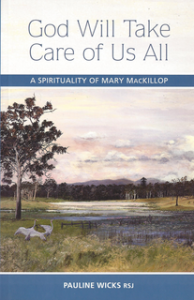 From her earliest years Mary MacKillop had learnt from her grandparents and parents that ‘God will take care of us all’. This deep trust in God’s loving care became fundamental to her spirituality.
From her earliest years Mary MacKillop had learnt from her grandparents and parents that ‘God will take care of us all’. This deep trust in God’s loving care became fundamental to her spirituality.
Her life as a pioneer Australian Christian provides for us today a model for living our Baptismal call. Her spirituality, which found expression in her heroic devotedness to her ‘good God’ and to the needy, is the subject of this book and is explored through her writings from 1860 to 1874.
Mary’s response to God’s grace enabled her to live by the will of God, to trust in the providence of a ‘good God’ and allow the cross to transform her life. Mary asks us, as she did her mother in September 1870, ‘do you try now in real earnest to be a saint?’
This new eBook is available through Amazon Kindle and Apple iBook.
Pauline Wicks rsj
I am Josephite: Pauline’s Story
August 3, 2020To celebrate National Vocations Awareness Week (2-9 August 2020), a new series has been launched called ‘I am Josephite.’
This video features Pauline’s story. Pauline is a Josephite Associate and said that her “life and ministry intertwine.”
You’re invited to view the video provided below:
First Maori School 1891
St Joseph’s Maori School, Matata in New Zealand 1891-1894.
Two Mill Hill priests of Saint Joseph’s Foreign Missionary Society from Mill Hill, London, England, were sent as missionaries to Aotearoa New Zealand and particularly to the Maori people. They arrived at Christmas, 1886, and were appointed to Matata by Bishop Luck of the diocese of Auckland. Their goal was to revitalize the faith among the Maori people. The bitterness of the Maori wars, the poor influence of some Europeans, and the lack of priests to maintain contact with Maori converts were felt keenly by the Catholic hierarchy. Mary MacKillop was asked for Sisters to staff the proposed Maori Mission school at Matata.
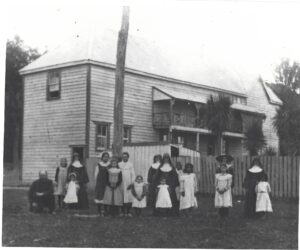 Mary MacKillop sent the first Josephite Community, Sisters Xavier Molony, Francis Fitzgerald and Louis Hoare in 1890 to work alongside the Mill Hill Fathers. They arrived in Matata on 9th February 1891 and as there was neither convent nor school ready for use, they stayed at the local hotel. A two- storeyed building with accommodation for Sisters and boarders on the upper floor and schoolroom on the ground floor was built. The school was opened on 3 August 1891 with a roll of 52 pupils. The attendance at school fluctuated. In 1895 Sister Xavier wrote about the cold experienced in the school.
Mary MacKillop sent the first Josephite Community, Sisters Xavier Molony, Francis Fitzgerald and Louis Hoare in 1890 to work alongside the Mill Hill Fathers. They arrived in Matata on 9th February 1891 and as there was neither convent nor school ready for use, they stayed at the local hotel. A two- storeyed building with accommodation for Sisters and boarders on the upper floor and schoolroom on the ground floor was built. The school was opened on 3 August 1891 with a roll of 52 pupils. The attendance at school fluctuated. In 1895 Sister Xavier wrote about the cold experienced in the school.
Annie MacKillop accompanied Mary on her first visit to New Zealand. She has left a vivid picture of what travel would have been like. She talks of a dreadful road, up and down hills with the road just wide enough for one trap and not many resting places or nourishing food on the fifty-six-mile drive from the port of Tauranga to Matata – the last stage at night. It was only after Mary MacKillop sent the first Josephite community, Sisters Xavier Molony and Francis Fitzgerald that Mary and Annie realised how dangerous their first journey had been.
The letters of Mary MacKillop describe the conditions in Matata as she found them three years after the first school was opened. Mary was given a great welcome by the Maori People and she set about improving conditions for the Sisters, the pupils in the School, and for their families. Mary wrote a school report for “St Joseph’s Maori School Matata Bay of Plenty” in 1894. She noted the children’s progress and recommended that the Sisters give oral lessons in grammar from time to time. Before Mary left New Zealand, she sent them kegs of butter, dripping, necessaries and wire netting which she had begged for while she was travelling about.
Colleen Dempsey rsj
Media Release: National Vocations Awareness Week
August 2, 2020Drawing on the wisdom of Saint Mary MacKillop through National Vocations Awareness Week (2-9 August 2020).
Each year the Church celebrates National Vocations Awareness Week. This week is dedicated to promoting the various expressions of Christian vocation with a focus on promoting priesthood and consecrated life.
This year, a group of Josephite Sisters and Affiliates have been asked to contribute video content about their Ministries and how they participate in God’s mission today.
“The response has been extremely pleasing, and we are thrilled to showcase the great works of these individuals,” said Kathleen Norman, Communications Manager, Sisters of Saint Joseph. “The first of the content series will be launched on Sunday 2 August in time for the start of National Vocations Awareness Week, and then continue throughout the remainder of this year.”
Drawing from reflection on Saint Mary MacKillop’s experience, Sister Monica added: “My advice to young Australians of faith is – be the voice of the gospel and the face of God in the world today. Be courageous; use your passion and energy to address the critical issues facing the world and church today.”
During these unusual times throughout the COVID-19 pandemic, research shows us there is a new openness to the sharing of faith in 2020. Australians have turned to prayer during the coronavirus with many wanting to spend more time growing their faith once restrictions are lifted.
The Sisters of Saint Joseph believe that Saint Mary MacKillop would offer encouragement during these difficult times. In 1907 she wrote to the Sisters:
Sr Monica Cavanagh, Congregational Leader, believes strongly that Mary MacKillop is with us:
Saint Mary MacKillop herself wrote about her testing experience of being dangerously unwell:
I was for many weeks dangerously ill, so ill that I nearly died… I was weary of the world and its crosses… The mental conflict had been too much for me.
Please continue reading the Media Release here (PDF)
For more information, please contact:
Kathleen Norman
Communications Manager
Sisters of Saint Joseph
Kathleen.Norman@sosj.org.au
+61 2 8912 2722 +61 438 006 566
National Vocations Awareness Week
For National Vocations Awareness Week (NVAW) starting on Sunday 2 August and concluding on Sunday 9 August 2020, you’re invited to view a reflection by Sr Clare Conaglen.
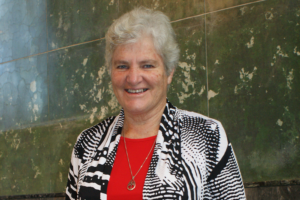
My Dad was a doctor. As kids we learnt that we had to share him with many other people unknown to us. For Dad being a doctor was more than a profession or career, it was a vocation, a belief that God was calling him, and that God had given him the gifts necessary. [1] He was dedicated, he gave his life to it and even when he was sick himself for a nearly a year, his patients all returned to him knowing that he cared for them with compassion and genuine concern. Mum was always the support and in turn lived out her vocation of spouse, mother and carer of the carer.
What do we mean by Christian vocation or call? It is not that we are doctors or priests, construction workers, secretaries or religious. It is more a sense that God is intimately involved in our lives and calls us to participate in making our planet, with humans and non-humans alike, more just, caring and loving, building and participating in the reign of God here and now.
However not everyone wants to hear this message and violence, racism, greed, egocentrism and destruction of our planet continue. Jesus doesn’t beat around the bush when he says, “whoever does not take up the cross and follow me is not worthy of me.” (Matt 10: 39). How Jesus uses the word worthy means more about ‘capable’, ‘ready’, ‘equal to.’ Am I worthy of, up to it, ready, capable of Jesus? None of us are capable by our own efforts. With the support of a spouse or of a community we can respond to Jesus’ challenge.
Jesus continues “Those who find their life will lose it and those who lose their life for my sake will find it.” (Matt 10:39). Am I prepared to lose my life for the sake of Jesus? Our world today says you must be self-realised, achieve your utmost, be someone, make your mark in the world. Jesus asks us to be faithful, using our gifts and time for others, for our world. We will find meaning in our lives, we will have life.
My life as a Sister of St Joseph has led me into the classroom teaching mathematics and science in New Zealand and Samoa- such small islands in the Pacific with a culture rich in dignity and respect for each other. The students there saw themselves as the centre of the world and lived into their dreams for education and a career, living their vocation.
My life has also taken me to Peru for 16 years working alongside some wonderful people in a parish on the edge of the Lima where people come from the mountains and the jungle areas with their hopes and dreams to start a new life, a better education for their children and a better job. They carve out settlements on the dry and dusty hills of the desert in which surround Lima. Poverty abounds but a spirit of resilience also abounds.
Now I find myself on the Congregational leadership team in North Sydney which brings yet another set of challenges. And underneath and through the activity and challenges there is a constant flowing stream -the call, that relationship of love with God that invites us on. Are you up to the challenge? Are you capable? My Dad and Mum said “yes.” With the support of a community we can say ‘’yes.”
Sr Clare Conaglen
Footnote:
[1] Idea taken from Mary M McGlone, Scripture for Life Column, NCR, 13th Sunday of Ordinary Time 2020
Celebrate Mary’s Feast Day with Mary MacKillop Today
July 30, 2020Provided below is a message from Mary MacKillop Today to schools about the feast of Mary MacKillop on 8 August 2020.
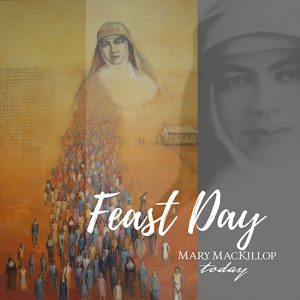 Mary MacKillop’s Feast Day is coming up in August.
Mary MacKillop’s Feast Day is coming up in August.
This year is particularly special because it is the 10 year anniversary since Mary was canonised as Australia’s first Saint. Education was close to Mary’s heart and she knew its power to lift communities out of poverty. This is why Mary MacKillop Today is asking schools across Australia to celebrate Mary’s Feast Day with us and raise funds to help give children in Fiji access to early education!
Throughout August, we’re inviting schools to hold their own fundraising activities and set a target of $1,500 (or more!). That’s enough to give a vulnerable community in Fiji the resources they need to build a safe and effective learning environment for eager children.
Once your school is registered, Mary MacKillop Today will provide resources to help your school promote and run a successful fundraiser.
Click the link below to register for your school’s resources today and celebrate Mary MacKillop’s legacy by helping transform lives with the gift of education:
Mary MacKillop Feast Day fundraising activities
If you have any questions, please don’t hesitate to contact Madeleine Gough, Mary MacKillop Today’s Community Partnerships Coordinator, directly via email madeleine.gough@marymackilloptoday.org.au or telephone on (02) 8912 2708
Nine Days With Mary MacKillop Novena
July 29, 2020These nine days will offer an opportunity to pray and reflect on scripture, Mary MacKillop and your own lives, all within your own time.
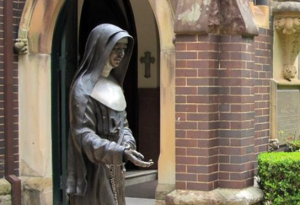 Friday 31 July marks the beginning of our Novena – a time when we can reflect on how the Scriptures, Mary MacKillop’s life and our life intertwine to encourage us in all that we do.
Friday 31 July marks the beginning of our Novena – a time when we can reflect on how the Scriptures, Mary MacKillop’s life and our life intertwine to encourage us in all that we do.
As this Novena is online – you might like to form a group or two to share in this retreat together.
Thank you for praying together as we look forward to celebrating the feast day of Saint Mary MacKillop (Saturday 8 August).
Day One, 31 July: Opening To Our Potter God
- Day One: YouTube version (compatible with all devices)
- Day One: PDF version (suitable for iPad, Android and PC users)
- Day One: PowerPoint version (best suited for those using a PC)
Day Two, 1 August: Becoming Good Soil
- Day Two: YouTube version (compatible with all devices)
- Day Two: PDF version (suitable for iPad, Android and PC users)
- Day Two: PowerPoint version (best suited for those using a PC)
Day Three, 2 August: Becoming Light for the World
- Day Three: YouTube version (compatible with all devices)
- Day Three: PDF version (suitable for iPad, Android and PC users)
- Day Three: PowerPoint version (best suited for those using a PC)
Day Four, 3 August: Becoming Salt for the Earth
- Day Four: YouTube version (compatible with all devices)
- Day Four: PDF version (suitable for iPad, Android and PC users)
- Day Four: PowerPoint version (best suited for those using a PC)
Day Five, 4 August: Encountering God
- Day Five: YouTube version (compatible with all devices)
- Day Five: PDF version (suitable for iPad, Android and PC users)
- Day Five: PowerPoint version (best suited for those using a PC)
Day Six, 5 August: Loving Tenderly
- Day Six: YouTube version (compatible with all devices)
- Day Six: PDF version (suitable for iPad, Android and PC users)
- Day Six: PowerPoint version (best suited for those using a PC)
Day Seven, 6 August: Acting Justly
- Day Seven: YouTube version (compatible with all devices)
- Day Seven: PDF version (suitable for iPad, Android and PC users)
- Day Seven: PowerPoint version (best suited for those using a PC)
Day Eight, 7 August: Walking Humbly
- Day Eight: YouTube version (compatible with all devices)
- Day Eight: PDF version (suitable for iPad, Android and PC users)
- Day Eight: PowerPoint version (best suited for those using a PC)
Day Nine, 8 August: Feast Day
- Day Nine: YouTube version (compatible with all devices)
- Day Nine: PDF version (suitable for iPad, Android and PC users)
- Day Nine: PowerPoint version (best suited for those using a PC)
Good Grief: Stormbirds and Youth Wellbeing
Good Grief [1] has provided an update on their program Stormbirds and some resources on youth wellbeing.
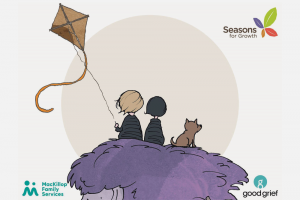 The bushfires across New South Wales, South Australia, Victoria and southern Queensland were unprecedented.The changes and losses experienced as a result of a natural disaster can be traumatic, complex and ongoing. Research following the Black Saturday fires in Victoria reveal that 5 years on, communities are still suffering mental health concerns at rates twice the general population.
The bushfires across New South Wales, South Australia, Victoria and southern Queensland were unprecedented.The changes and losses experienced as a result of a natural disaster can be traumatic, complex and ongoing. Research following the Black Saturday fires in Victoria reveal that 5 years on, communities are still suffering mental health concerns at rates twice the general population.
Stormbirds is an early intervention education program that provides tailored support to children and young people affected by natural disasters. The program was developed by Good Grief in response to the Black Saturday Bushfires in Victoria and recently, the Stormbirds program has been reviewed and updated to support the children and young people affected by recent natural disasters.
Listen to our training coordinator Louise Hall discuss discuss the Stormbirds program with Simon Lauder on ABC News Radio.
With all the changes we experience in our lives, we may experience a range of emotions and reactions – we do not often recognise these as grief experiences.
Fiona McCallum, General Manager of Good Grief presented on ‘Seasons for Growth 25 years on – Educating children to live well with change, loss and uncertainty’ on the Youth Health Forum: “A long and winding road: Navigating the journey of grief and loss”. Youth Health Forums are stimulating, half-day forums that cover a wide range of adolescent health and wellbeing issues, appealing to health, education, community, welfare professionals and students.
Additionally, Good Grief has provided a resource titled Supporting your Child’s Social & Emotional Wellbeing which includes some ideas to help children and young people in times of uncertainty.
Visit the Good Grief website here
Footnote:
[1] A former ministry of the Sisters of Saint Joseph, now part of MacKillop Family Services.
